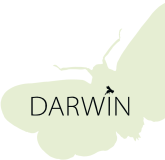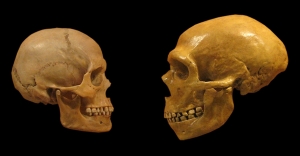
 |
Darwin Day 2015
|
|||||||||||
|
Where are you from? What were your ancestors like? While you can describe your parents and grandparents - and maybe one or two generations further - others dig deeper. Using archeological findings from across the world and a combination of molecular DNA methods, anatomy of bone remains, stone tools and other artefacts, scientists are now beginning to understand where our own species originated and how the diversity of humans has evolved since. |
 Skulls of a human (left) and a neanderthal. (Photo: hairymuseummatt, modified by DrMikeBaxter.)
Skulls of a human (left) and a neanderthal. (Photo: hairymuseummatt, modified by DrMikeBaxter.)
|
Marta Mirazón Lahr
The evolution of humans and their diversity: integrating genes, fossils and behaviour
Summary
While in 1872 Darwin anticipated the origins of the hominin line being in Africa, he could not have predicted that it is also the point of origin for our own species, Homo sapiens. There is now abundant evidence that this is the case, drawn from the fossil and archaeological records, and from ancient and contemporary genetics. However, where this was originally seen as a relatively rapid and simple event, it is now clear that the evolution of modern humans and their diversity, their origins in Africa, and their dispersals beyond, is a rich and complex history. Unravelling this story is a challenge requiring multi-disciplinary approaches. In this lecture I shall explore some of the major questions in recent human evolution, and discuss, with examples from our recent fieldwork in Africa, how we can bring together biological, behavioural and environmental aspects of humans and their diversity.
|
In year 2000 Marta Mirazón Lahr co-founded with Professor Robert Foley the Leverhulme Centre for Human Evolutionary Studies at the Department of Archaeology & Anthropology of the University of Cambridge, UK. Central to the Centre is the Duckworth Laboratory, one of the world's largest collections of archeological human remains, where Marta is now director. She also runs In Africa, a five-year project funded by the European Research Council (ERC) to investigate the origins of modern humans and of modern human diversity in East Africa in the last 250,000 years. The talk will be introduced by Professor Lawrence Kirkendall, Department of Biology, University of Bergen. |
Who is behind the Darwin Day in Bergen?
The Darwin Day 2015 in Oslo
Earlier events
2014, 2013, 2012, 2011, 2010, 2009, 2008, 2007.
 |
UNIVERSITETET I BERGEN Institutt for biologi |